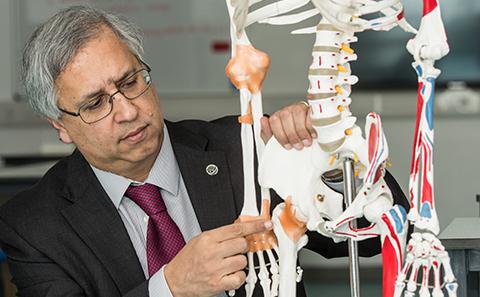Tackling an ageing problem before birth
How supplements in pregnancy can reduce the risk of potentially fatal bone fractures in later life
It was long assumed to be an inevitable consequence of ageing with half the female population and one in five men over the age of 50 suffering from osteoporotic fractures. Along with the heath impact, the condition also causes a significant financial burden as it costs the UK an estimated £4bn each year.
Those stark figures, and evidence from earlier studies suggesting that early development is important for later bone health, were the impetus for a groundbreaking study lead by University of Southampton researchers to discover whether more could be done to protect the population from the condition, for which associated fractures can increase the mortality rate in older people by around 20 per cent.
Led by the team at Southampton’s Medical Research Council (MRC) Lifecourse Epidemiology Unit (LEU), the MAVIDOS trial was designed to discover whether the condition that so debilitates the population in later life could be tackled in infancy.
Nicholas Harvey, Professor of Rheumatology and Clinical Epidemiology at the MRC unit, explained: “As osteoporosis is such a common problem, it makes sense to address the risk across the population, and that is the aim addressed by our work. If we can improve bone density across the population then we can prevent fragility fractures.
“What happens in early life, for example exposure to vitamin D in the womb, may have an impact on skeletal growth and risk of fracture in older age.”
As osteoporosis is such a common problem, it makes sense to address the risk across the population, and that is the aim addressed by our work. If we can improve bone density across the population then we can prevent fragility fractures.
Could vitamin D be the key to improving bone health?
Previous work from the MRC LEU indicated that mothers who had low levels of vitamin D during pregnancy had children with reduced bone mass at nine years old. These findings were replicated in some, but not all studies, and so Southampton researchers undertook the MAVIDOS trial, aiming to test whether supplementation with vitamin D during pregnancy would lead to increased bone mass of the baby at birth.
Around 1,400 women were randomised to vitamin D or an identical placebo tablet daily, from 14 weeks gestation until delivery of the baby. Mothers were assessed in early and late pregnancy and the main outcome of the trial was the bone mass of the babies, measured soon after birth using DXA bone densitometry.
While the intervention did not increase bone mass of the babies overall, it did appear to have a marked effect in those babies born in the winter months.
Nick comments: “In the winter months background levels of vitamin D are at their lowest. The findings from the MAVIDOS trial suggest that, while the supplement did not lead to an overall increase in offspring bone mass, it protected babies born in winter months from the marked drop in vitamin D levels that would otherwise be experienced from early to late pregnancy.
“Thus vitamin D supplementation in pregnancy led to an increased bone mass compared with placebo among babies born in winter months.”
Professor Cyrus Cooper, Professor of Rheumatology and Director of the MRC LEU who oversaw the study, added: "The MAVIDOS trial forms part of a larger programme of research at the MRC Lifecourse Epidemiology Unit, University of Southampton, in which we seek to develop interventions early in life to improve bone health. Our findings, of a potential benefit for pregnancy of vitamin D supplementation for winter births, and our demonstration of its safety and effectiveness in raising vitamin D levels, will lead to a re-evaluation of the current policy in the UK, and with future confirmation from our ongoing studies, may help optimise the dose recommended.”
Our findings, of the potential benefit for pregnancy of vitamin D supplementation for winter births, and our demonstration of its safety and effectiveness in raising vitamin D levels, will lead to a re-evaluation of the current policy in the UK.
Findings now help shape public health guidance
Indeed evidence from MRC LEU studies has informed the UK Scientific Advisory Committee recommendations on vitamin D intake, which have recently been the basis of guidance, incorporating season specific advice, by Public Health England.
The success of the study has enabled further investment from Arthritis Research UK, which also funded the original study together with MRC and the National Institute for Health Research, meaning the cohort of children on the study can be assessed as six to eight year olds to see whether the benefits continue into later childhood.
The MAVIDOS trial has also led to a second pregnancy study, the SPRING trial, investigating the role of vitamin D supplementation in conjunction with a novel intervention called Healthy Conversation Skills.
These skills allow women to identify barriers to compliance with supplements diet or health behaviours and so empower them to feel able to make better choices about their health in pregnancy.
Again women are being randomised into groups receiving vitamin D or placebo, and then further split into groups of those who receive Healthy Conversation Skills and those who don’t. Nick added: “We are examining whether it is enough to say you need supplements or whether there are other behavioural factors that could be implemented to maximise compliance and improve health behaviour.”
He concluded: “The results from the MAVIDOS trial, and our further analyses identifying particular factors associated with achieved vitamin D levels in response to treatment, really help us understand how to improve vitamin D status in pregnancy, and the benefits this may have for the baby.
“Our ongoing work with MAVIDOS childhood follow-up and the SPRING trial will help us to confirm our previous findings and establish whether improvements persist beyond the infant period, and thus should critically inform future public health policy aimed at optimising vitamin D status in pregnancy.”
Related Staff Member
Related Staff Member
You may also be interested in:

Tackling public health challenges
Instigating step changes in public health, both in the UK and internationally.

The challenges of ageing
Vaccinations could prevent against Alzheimer’s disease

Alzheimer's: managing the conversation
Speech as an indicator of dementia

